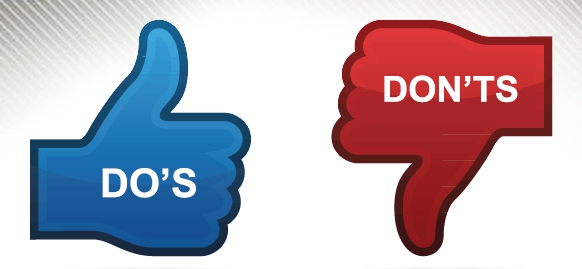
AAU Do’s and Don’ts – Maximize Exposure
Excuse the tone and bluntness on the topic ahead, but this is the most effective way to detail what was seen over the weekend in Pittsburgh at Hoop Group’s Pitt Jam Fest and across America during the AAU circuit. While most high school basketball prospects have convinced themselves that they received exposure to NCAA coaches, there are many factors and a lack of intangible traits that would suggest otherwise. The intent of this piece is not to take away from the efforts of the players or shoot down their confidence. Instead, it is to inform them on necessary steps that will maximize exposure when they are back at in July.

Take notice that there is nothing you will read here that points to making shots, or creating plays off the dribble, instead the focus is on nuances that help elevate the qualities of teams and individuals.
Scoring production is not even close to the only thing NCAA coaches look for when evaluating. Be well rounded with intangibles and be a likable teammate.
Mental Approach
Studying the psyche of a potential scholarship player is important in gauging what level they will be projected to play at and ensuring accuracy of that projection. For many, they have failed in this regard.
Student-athletes have taken the focus off of winning and placed it on gaining scholarships, not realizing that winning, in part, is what leads to more looks from coaches while on the AAU circuit. The further a team goes in a tournament, the more coaches there will be in the stands evaluating.
If a prospect’s thought process is, “I’m going to get an offer this weekend” than he or she is already hurting the team before the game even starts. This type of prospect is concerned with individual achievement, not team success. Subliminally, that prospect will be focused on themselves and have an innate interest in taking more shots, blaming others for team mistakes and not holding themselves accountable on defense. All of this ruins any chemistry that has been built prior to arriving at the tournament.
Word of advice. DON’T place ANY focus on exposure, DO direct all energy towards winning.
The lack of focus on winning is evident by scrolling down social media timelines, that’s the first hint. Some want to tell the whole world what they’re doing from the moment they leave their home city, to checking-in at the hotel, to arriving at the gym. These social media junkies lose credibility quickly and make it difficult to take them seriously.
The second hint comes from watching a prospects wandering eyes; looking around the gym and gazing to laser in on the logos on the chest of coaches in the stands. When it becomes habitual and consistent throughout the game, this is when it becomes a problem.
Game Preparation
Athlete’s that are serious about competition usually have a ritual, routine or method of preparing for a game mentally and physically, and yes this is taken into account when evaluating an athlete. Good scouts take notice of it all.
The layup and shooting lines that take a majority of the allotted warm up time on the clock are not the game preparation that is being referred to, although it is a big part of getting into an in-game rhythm. In these lines, it’s important that everything is done at game speed. The amount of players that waste valuable warmup time is very high, take it seriously in order to be effective in game.
An example of proper game prep was noticed in some of the hallways and even outdoors where players were taking part in dynamic stretching in order to get their muscles loose for the movements and torque that will be placed on their bodies. Physically, these players were ready to perform.
Mental prep was seen from recent Carleton Ravens commit Marcus Anderson, who opened a lot of NCAA eyes that didn’t know about him previously. Prior to team warmups, Anderson took his teammates aside and discussed game strategy and reviewed pointers from last game that helped them win.
Finding Value
Whatever the number of players on any given roster, each player has been selected on a team to fill a certain role. Some are aware of that role and what they can provide to help a team win games, while others try to play outside of their role and end up with forcing shots or drives which end up in turnovers or transition points for the opposition.
It is everyone’s role to score as much as it is everyone’s role to rebound and play defence, however some are stronger in certain areas of the game than others. When players are accepting of their roles, the team’s efficiency rating is held high equalling more success for the group.
Roles
- vocal leader
- defensive anchor
- go-to scorer
- Distributor
- paint protector
- energy provider
- sniper
Body Language
Body language is monitored closely when a team is down or loses a lead, if they’re up and are extending their lead, or if a player is on the bench waiting to be called up. There are many other key moments where coaches take notice of body language.
Most players fall apart when their team loses a lead and get down on themselves, bringing the overall morale of the team down. They get sluggish and have their hands on their hips, shaking their heads side to side and look at the scoreboard with discontent.
Then there’s the exact opposite. The body language of a player that wants to get to the next level and has a “never say die” attitude. These players motivate their squad and keep energy levels high in order to respond to a deficit.
Composure is the component that keeps it all together. It goes the same for when teams are up. It’s not enough to have the lead; the team must be thinking, “let’s bust this thing open and make sure they don’t come back.”
Come from behind victories happen when the team that is up stops applying pressure defensively or when players start to conserve energy by only exerting it on offense.
Moreover, physical touch is just as important when it comes to body language. High fives, chest bumps and other forms of physical contact serve as important energy providers and momentum builders.
Do’s
- Accept constructive feedback
- Focus on winning
- Defend at all times
- Prepare for games mentally and physically
- Play within your role/skill set
- Close out games with big leads
- Eliminate distractions (Social media, media)
- Provide energy from the bench
- Keep positive energy and composure regardless of situation
- Provide composed and motivating body language
Don’ts
- Don’t Make Excuses
- Don ‘t Complain
- Don’t focus on exposure
- Don’t waste warmup time
- Don’t kill the morale of the team
- Don’t overuse social media
- Don’t conserve energy, play with high energy and sub when needed.

